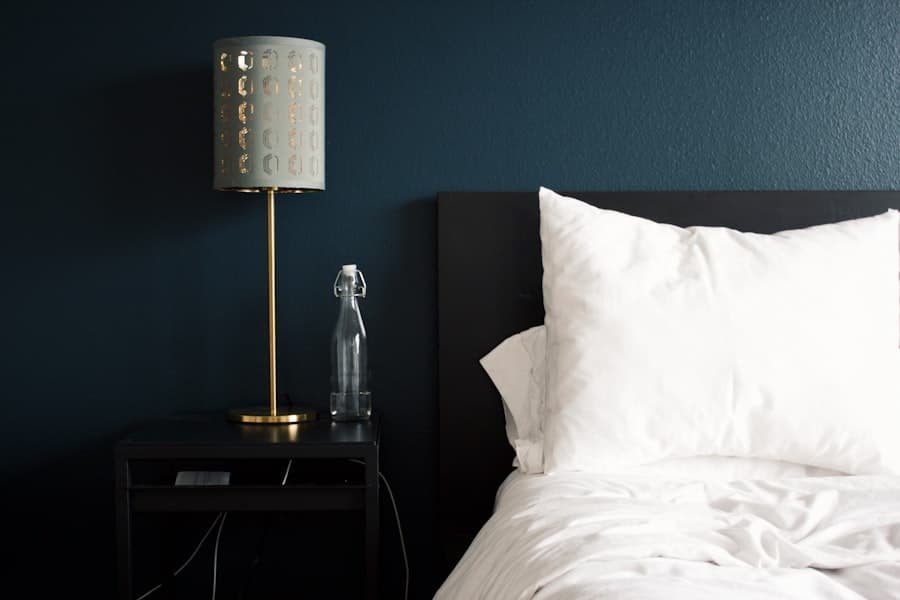The advent of artificial intelligence (AI) has permeated various sectors, revolutionizing how we interact with technology in our daily lives. One of the most intriguing applications of AI is in the realm of sleep technology, particularly through the development of AI-enabled smart beds. These innovative sleep solutions are designed to enhance the quality of sleep by utilizing advanced algorithms and sensors to monitor and respond to individual sleep patterns.
As sleep is a fundamental aspect of human health and well-being, the integration of AI into bedding systems represents a significant leap forward in our understanding and management of sleep. AI-enabled smart beds are equipped with a variety of features that allow them to adapt to the user’s needs in real-time. From adjusting firmness levels to optimizing temperature, these beds are engineered to create an ideal sleep environment tailored to each individual.
The growing awareness of the importance of sleep hygiene has led to increased interest in these technologies, as consumers seek solutions that promise not only comfort but also improved health outcomes. As we delve deeper into the mechanics and implications of AI-enabled smart beds, it becomes clear that they are more than just a luxury item; they are a potential game-changer in the pursuit of better sleep.
Key Takeaways
- AI-enabled smart beds use artificial intelligence to optimize sleep quality and provide personalized sleep solutions.
- These beds work by collecting and analyzing data such as heart rate, breathing patterns, and movement to adjust the bed’s settings for optimal comfort and support.
- The benefits of AI-enabled smart beds include improved sleep quality, reduced snoring, and the ability to track and monitor sleep patterns for better overall health.
- Potential drawbacks and limitations of AI-enabled smart beds include high cost, reliance on technology, and the need for regular updates and maintenance.
- The future of AI-enabled smart beds in healthcare looks promising, with potential applications in monitoring and managing sleep disorders and chronic conditions.
How AI-Enabled Smart Beds Work
Sensors and Algorithms Working Together
At the core of AI-enabled smart beds lies a sophisticated network of sensors and algorithms that work together to monitor various parameters related to sleep. These beds typically feature pressure sensors that detect body movements, heart rate monitors that track cardiovascular activity, and temperature sensors that assess the microclimate around the sleeper.
Real-Time Adjustments for Better Sleep
By collecting this data, the bed can analyze sleep patterns and make real-time adjustments to enhance comfort and support restful sleep. For instance, if a user tends to shift positions frequently during the night, the bed can automatically adjust its firmness or elevation to provide better support and reduce disturbances.
Machine Learning and Personalization
Some models even incorporate machine learning capabilities, allowing them to learn from the user’s habits over time.
Tracking Sleep Quality with Mobile Apps
Additionally, many smart beds are compatible with mobile applications, enabling users to access detailed insights about their sleep quality and make informed decisions about their sleep environment.
Benefits of AI-Enabled Smart Beds for Sleep Optimization

The primary advantage of AI-enabled smart beds is their ability to optimize sleep quality through personalized adjustments. By continuously monitoring physiological signals, these beds can create an environment that promotes deeper and more restorative sleep. For example, studies have shown that maintaining an optimal temperature during sleep can significantly impact sleep quality.
Smart beds can automatically adjust their temperature settings based on the user’s preferences and body heat, ensuring a comfortable sleeping experience throughout the night. Moreover, AI-enabled smart beds can contribute to better overall health by addressing common sleep disorders such as insomnia or sleep apnea. Some models are equipped with features that detect irregular breathing patterns or snoring, prompting the bed to adjust its position or alert the user.
This proactive approach not only enhances comfort but also encourages healthier sleep habits. Furthermore, by providing users with detailed analytics about their sleep patterns, these beds empower individuals to make lifestyle changes that can lead to improved sleep hygiene.
Potential Drawbacks and Limitations of AI-Enabled Smart Beds
Despite their numerous benefits, AI-enabled smart beds are not without their drawbacks. One significant concern is the cost associated with these advanced technologies. High-quality smart beds can be prohibitively expensive for many consumers, limiting access to those who may benefit most from enhanced sleep solutions.
Additionally, while some users may appreciate the advanced features, others may find them overwhelming or unnecessary, leading to a disconnect between user expectations and actual benefits. Another limitation lies in the reliance on technology for sleep management. While data-driven insights can be valuable, there is a risk that users may become overly dependent on their smart beds for achieving good sleep.
This dependency could lead to anxiety or stress if users feel they are not meeting their sleep goals as indicated by the bed’s analytics. Furthermore, there is a potential for technological malfunctions or inaccuracies in data collection, which could mislead users about their sleep quality and lead to misguided attempts at improvement.
The Future of AI-Enabled Smart Beds in Healthcare
As healthcare continues to evolve with technological advancements, AI-enabled smart beds hold significant promise for integration into clinical settings. Hospitals and rehabilitation centers could leverage these technologies to monitor patients’ sleep patterns more effectively, leading to better recovery outcomes. For instance, patients recovering from surgery often experience disrupted sleep due to pain or discomfort; smart beds could be programmed to adjust automatically based on real-time feedback from the patient’s physiological data.
Moreover, AI-enabled smart beds could play a crucial role in managing chronic conditions that are exacerbated by poor sleep quality. For example, individuals with heart disease or diabetes often struggle with sleep-related issues that can complicate their health management. By providing healthcare professionals with detailed insights into patients’ sleep patterns, these smart beds could facilitate more personalized treatment plans and interventions.
The potential for remote monitoring also opens up new avenues for telehealth services, allowing healthcare providers to track patients’ progress from afar and make timely adjustments to their care plans.
Privacy and Security Concerns with AI-Enabled Smart Beds

As with any technology that collects personal data, privacy and security concerns are paramount when it comes to AI-enabled smart beds. These devices gather sensitive information about users’ sleeping habits, health metrics, and even personal preferences. If not adequately protected, this data could be vulnerable to breaches or unauthorized access, raising significant ethical questions about user consent and data ownership.
Manufacturers must prioritize robust security measures to safeguard user data against potential cyber threats. This includes implementing encryption protocols for data transmission and storage, as well as ensuring compliance with regulations such as the Health Insurance Portability and Accountability Act (HIPAA) in healthcare settings. Additionally, users should be educated about their rights regarding data privacy and given control over what information is collected and shared.
Transparency in data handling practices will be essential for building trust between consumers and manufacturers in this rapidly evolving market.
Consumer Adoption and Market Trends of AI-Enabled Smart Beds
The market for AI-enabled smart beds is experiencing significant growth as consumer awareness of sleep health increases. A rising number of individuals are recognizing the importance of quality sleep for overall well-being, leading them to invest in technologies that promise enhanced restfulness. According to market research reports, the global smart bed market is projected to grow substantially over the next few years, driven by innovations in technology and increasing consumer demand for personalized solutions.
Moreover, as more companies enter the market with diverse offerings ranging from budget-friendly options to high-end luxury models, consumers have a wider array of choices than ever before. This competition is fostering innovation as manufacturers strive to differentiate their products through unique features such as integrated wellness tracking or compatibility with other smart home devices. As consumer preferences continue to evolve, it is likely that we will see further advancements in AI-enabled smart bed technology aimed at enhancing user experience and satisfaction.
The Role of AI-Enabled Smart Beds in the Future of Sleep Optimization
AI-enabled smart beds represent a significant advancement in our understanding of sleep optimization and health management. By harnessing the power of artificial intelligence and advanced sensor technology, these beds offer personalized solutions that cater to individual needs and preferences. As we continue to explore the intersection of technology and health, it is clear that AI-enabled smart beds will play an increasingly vital role in promoting better sleep hygiene and overall well-being.
The future landscape of sleep technology will likely be shaped by ongoing innovations in AI and machine learning, leading to even more sophisticated solutions for consumers and healthcare providers alike.
Ultimately, AI-enabled smart beds have the potential not only to transform our sleeping experiences but also to contribute significantly to our understanding of health and wellness in an increasingly complex world.
If you are interested in the future of AI technology and its impact on various industries, you may also want to check out the article on Top Trends on Digital Marketing 2023. This article explores how AI is revolutionizing the field of digital marketing and shaping the way businesses connect with consumers. It provides insights into the latest trends and strategies that companies are using to stay ahead in the competitive digital landscape.
FAQs
What are AI-enabled smart beds?
AI-enabled smart beds are beds equipped with artificial intelligence technology that can monitor and analyze sleep patterns, adjust mattress firmness and temperature, and provide personalized recommendations for improving sleep quality.
How do AI-enabled smart beds work?
AI-enabled smart beds use sensors to track sleep patterns, heart rate, and breathing. The data is then analyzed by the AI to provide insights into sleep quality and make adjustments to the bed’s settings to optimize sleep conditions for the user.
What are the benefits of AI-enabled smart beds for sleep optimization?
AI-enabled smart beds can help users improve their sleep quality by providing personalized recommendations, adjusting the bed’s settings to create an optimal sleep environment, and tracking sleep patterns to identify areas for improvement.
Are AI-enabled smart beds safe to use?
AI-enabled smart beds are designed with safety in mind and are generally safe to use. However, users should follow the manufacturer’s guidelines for proper use and maintenance to ensure safety.
What is the future of AI-enabled smart beds?
The future of AI-enabled smart beds is likely to involve further advancements in AI technology, more personalized sleep optimization features, and integration with other smart home devices for a seamless sleep experience.

